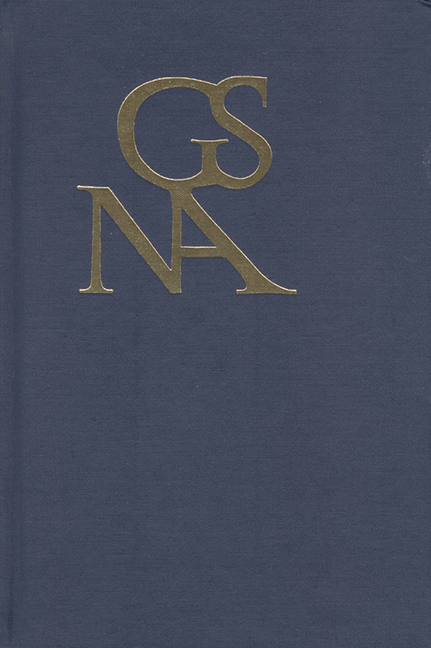Book contents
- Frontmatter
- Contents
- Special Section on What Goethe Heard, edited by Mary Helen Dupree
- What Goethe Heard: Special Section on Hearing and Listening in the Long Eighteenth Century
- Behind Herder's Tympanum: Sound and Physiological Aesthetics, 1800/1900
- Becoming the Listener: Goethe's “Der Fischer”
- Of Barks and Bird Song: Listening in on the Forgotten in Ludwig Tieck's Der blonde Eckbert
- Garden Empire or the Sublime Politics of the Chinese-Gothic Style
- Die Austreibung des Populären: Schillers Bürger-Kritik
- Goethe and the Uncontrollable Business of Appropriative Stage Sequels
- Repetition and Textual Transmission: The Gothic Motif in Goethe's Faust and “Von deutscher Baukunst”
- “Die gewalt'ge Heldenbrust”: Gender and Violence in Goethe's Iphigenie auf Tauris
- Literary Form and International World Order in Goethe: From Iphigenie to Pandora
- Two Gifts from Goethe: Charlotte von Stein's and Charlotte Schiller's Writing Tables
- Goethe's Wilhelm Meister and the Refusal to Grow Up: The Dialectics of Bildung
- “So steh' ich denn hier wehrlos gegen dich?”— Figures of Armament and Disarmament in German Drama before and after the French Revolution
- Goethe, Maimon, and Spinoza's Third Kind of Cognition
- Die Neuvermessung von Lyrik und Prosa in Goethes Novelle
- Book Reviews
What Goethe Heard: Special Section on Hearing and Listening in the Long Eighteenth Century
from Special Section on What Goethe Heard, edited by Mary Helen Dupree
Published online by Cambridge University Press: 16 May 2018
- Frontmatter
- Contents
- Special Section on What Goethe Heard, edited by Mary Helen Dupree
- What Goethe Heard: Special Section on Hearing and Listening in the Long Eighteenth Century
- Behind Herder's Tympanum: Sound and Physiological Aesthetics, 1800/1900
- Becoming the Listener: Goethe's “Der Fischer”
- Of Barks and Bird Song: Listening in on the Forgotten in Ludwig Tieck's Der blonde Eckbert
- Garden Empire or the Sublime Politics of the Chinese-Gothic Style
- Die Austreibung des Populären: Schillers Bürger-Kritik
- Goethe and the Uncontrollable Business of Appropriative Stage Sequels
- Repetition and Textual Transmission: The Gothic Motif in Goethe's Faust and “Von deutscher Baukunst”
- “Die gewalt'ge Heldenbrust”: Gender and Violence in Goethe's Iphigenie auf Tauris
- Literary Form and International World Order in Goethe: From Iphigenie to Pandora
- Two Gifts from Goethe: Charlotte von Stein's and Charlotte Schiller's Writing Tables
- Goethe's Wilhelm Meister and the Refusal to Grow Up: The Dialectics of Bildung
- “So steh' ich denn hier wehrlos gegen dich?”— Figures of Armament and Disarmament in German Drama before and after the French Revolution
- Goethe, Maimon, and Spinoza's Third Kind of Cognition
- Die Neuvermessung von Lyrik und Prosa in Goethes Novelle
- Book Reviews
Summary
THE THREE ESSAYS IN THIS SPECIAL SECTION ask a deceptively simple and seldom addressed question: What did Goethe (and his contemporaries) hear? While there are numerous monographs and essays on Goethe and visuality, sound and the acoustic dimension have not been explored in the same focused, sustained way in Goethe studies. Indeed, the acoustic dimension has often been marginalized in Goethe scholarship and in eighteenthcentury studies more generally, in which the Enlightenment “hegemony of the visual” tends to reproduce itself. Both in the cultural production of the “long eighteenth century” and in latter-day scholarship, the acoustic appears as the marginalized other of both textuality and visuality. In eighteenthcentury poetological texts and works of criticism, for example, an overemphasis on the acoustic performance of literature is often characterized as potentially inimical to the autonomy of the literary work. Such biases can be seen to be at work, for example, in Schiller's 1789 essay Über Bürgers Gedichte (On Bürger's Poems), in which Schiller distances himself from the oral performance of literature through mildly pejorative references to “Gesellschaftsgesänge” (convivial songs) and “die Musikliebhaberei unserer Damen” (the musical amateurism of our ladies) as well as more explicitly dismissive allusions to Gottfried August Bürger's onomatopoeic excesses—“das Klinglingling, Hopp, Huhu, Sasa, Trallyrum larum u. dgl (the klingaling, hopp, huhu, trallyrum larum and the like).” A simultaneous distrust of and longing for the acoustic dimension, particularly music and its sensual associations, is a recurring theme throughout German literary history: written many years before Thomas Mann's Wagnerian obsessives emerged on paper, the fateful reading of Ossian in Goethe's The Sorrows of Young Werther offers an early example of how Romantic orality can precipitate unhealthy excesses of emotion and unwholesome collisions of life with art. It is easy enough to contrast the Romantic obsession with reviving the “dead letter of print” through oral performance with Goethe and Schiller's seemingly more mature fascination with the visual and classicist literary forms; if the classical is “healthy,” to paraphrase Goethe's own famous line, it is because it has healed itself from the “sick,” irrational and regressive longings of Romanticism for primitive orality.
- Type
- Chapter
- Information
- Goethe Yearbook 25Publications of the Goethe Society of North America, pp. 3 - 10Publisher: Boydell & BrewerPrint publication year: 2018



